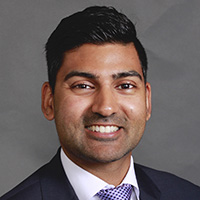
Hari Trivedi, MD
After completing an undergraduate degree in engineering at Georgia Tech, Emory Assistant-Professor Dr. Hari Trivedi began medical school with an open mind about what field to specialize in. While exploring different fields, Trivedi began to grow interested in the intersection of medicine and technology. He eventually settled on his chosen field, radiology, after witnessing how it combined his interests in both medicine and engineering.
“During radiology rotations, I thought radiology was just so cool because radiologists get all the newest toys,” Trivedi said. “I remember seeing my first 3D reconstruction of a CT scan, and that’s when I was like, OK, this is really interesting and powerful stuff.”
Today, Dr. Trivedi is both a practicing radiologist as well as a researcher in the field. He has worked on innovative improvements to medical diagnostic procedures such as breast cancer screening. Much of Trivedi’s research involves using Artificial Intelligence (AI) algorithms to deliver faster and more reliable diagnoses from medical imaging. Trivedi’s work involves balancing the development time and accuracy of this technology to ensure it can be deployed within a reasonable time frame while providing accurate diagnoses. Getting innovations deployed so they can improve patient outcomes is something that Trivedi always tries to stay focused on.
“Deployment is something that’s often overlooked, as 99% of AI machine learning technology gets stuck in the lab, Trivedi said. “So, while getting it deployed and integrated to a healthcare system is extremely complicated, unless you take that step, you really haven’t necessarily created anything of value.”
Trivedi views being a practicing clinician as an advantage for his research, as it provides him with a firsthand look at clinical issues that could be addressed by new innovations. This dual role can also be a challenge however, with the added complexity juggling different responsibilities brings. Trivedi views a key component of successful research as keeping in mind the expertise of each individual involved with a given project.
“There’s a lot of people that need to come together for a project succeed, which can sometimes take time, but that persistence is the key,” Trivedi said. “As long you’re persistent and stay on the radar, I think people are generally very good about making sure things get done.”
Trivedi has also had success commercializing some of his innovations, a process he views as a “natural extension of utility.” Under this principle, Trivedi always tries to provide innovations for free to other researchers who can find use for it. In some cases, however, Trivedi has filed for protection of intellectual property and licensed it out to commercial entities if this is the only way to financially sustain the innovation. One example is Trivedi’s work on algorithms for the anonymization of medical data. The tool requires ongoing maintenance and support, which necessitates charging a fee for use. Any other proceeds from commercialization go to supporting the needs of the lab and future research.
“That’s the way we look at commercialization, as if we build something useful, we do everything we can to give it away for free, Trivedi said. “But if it’s not going to be sustainable by giving it away for free, then we would try to license it to the appropriate person and use those funds to support the project.”
For those also seeking to become researchers, Trivedi’s key piece of advice is filtering out the noise to focus on individual goals and pursuits. This means worrying less about what others are doing and striving more to maintain focus on one’s own projects. As Trivedi believes, there’s never going to be a lack of discoveries to be made, and every researcher can make their own unique contributions to the scientific community.
“No problem is every really solved, there’s always room to innovate,” Trivedi said. “Things that we do literally hundreds of thousands of times per year, they’re still not perfect. So, I’d recommend not staying fixated on what others are doing, and I’d rather focusing on actually fixing and solving a problem at hand.”
Hari Trivedi: https://med.emory.edu/directory/profile/?u=HMTRIVE